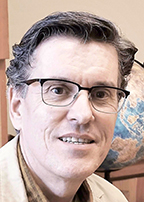Transboundary water governance: Possibilities and pitfalls at the nexus with energy and food security
View the recording of this talk on our Coffee Hour kaltura channel
About the talk
The resource nexus was initially conceived to address potential trade-offs in resource demands. Though the concept emerged from the water sector, it has now come to consider multiple, synergistic (or competing) cross-sectoral interactions. Scott et al. (2018) advanced thinking on water, energy and food security interactions mediated by institutions operating at the nexus, though invariably incapable of crossing resource domains, jurisdictional boundaries, or substantively accounting for ecological dynamics. Security as a nexus dimension posits an implied achievable end goal, which in practice has proven elusive. Alternative framings consider resilience with a focus on adaptive action and adaptive capacity in social-ecological systems terms. With the resilience dimension, nexus resource availability, environmental hazards, and the overall function, services and limits of interlinked earth systems must be balanced.
In this talk I will present and invite discussion on work in progress related to transboundary and interstate water and energy cooperation and conflict.Case material from South Asia on hydropower (Saklani et al., 2021) and Himalayan-region energy transitions, from Argentina on Andean hydropower-irrigation linkages as well as interstate water and energy conflicts, and from the US-Mexico borderlands on social-ecological sustainability partnerships will be used to elucidate nexus security and resilience framings.
About the speaker
 Christopher Scott is the Maurice K. Goddard Chair of Forestry and Environmental Conservation in the Department of Ecosystem Science and Management, College of Agricultural Sciences, Penn State. He spent 15 years at the University of Arizona, most recently as Director of the Udall Center for Studies in Public Policy, Professor in the School of Geography, Development & Environment, and Director of the Consortium for Arizona-Mexico Arid Environments. He currently serves as Chair of the Consensus Study on U.S. – Mexico Binational Sustainability Partnerships of both countries’ National Academies of Sciences, Engineering and Medicine. His sabbatical for field work in the Himalayas and Andes was a Covid casualty, though some of his initiatives have pivoted and remain underway. With PhD and MS in hydrology from Cornell University, and BS and BA from Swarthmore College, he has over three decades’ experience in international and domestic water, food, and energy policy.
Christopher Scott is the Maurice K. Goddard Chair of Forestry and Environmental Conservation in the Department of Ecosystem Science and Management, College of Agricultural Sciences, Penn State. He spent 15 years at the University of Arizona, most recently as Director of the Udall Center for Studies in Public Policy, Professor in the School of Geography, Development & Environment, and Director of the Consortium for Arizona-Mexico Arid Environments. He currently serves as Chair of the Consensus Study on U.S. – Mexico Binational Sustainability Partnerships of both countries’ National Academies of Sciences, Engineering and Medicine. His sabbatical for field work in the Himalayas and Andes was a Covid casualty, though some of his initiatives have pivoted and remain underway. With PhD and MS in hydrology from Cornell University, and BS and BA from Swarthmore College, he has over three decades’ experience in international and domestic water, food, and energy policy.
Suggested readings
- Saklani, U. P.P. Shrestha, A. Mukherji, C.A. Scott. 2020. Hydro-energy cooperation in South Asia: Prospects for transboundary energy and water security. Environmental Science and Policy 114: 22–34, doi: 10.1016/j.envsci.2020.07.013.
- Scott, C.A., T. Albrecht, R. de Grenade, A. Zuniga-Teran, R.G. Varady, B. Thapa. 2018. Water security and the pursuit of food, energy, and earth systems resilience. Water International 43: 1055-1074, doi: 10.1080/02508060.2018.1534564.

